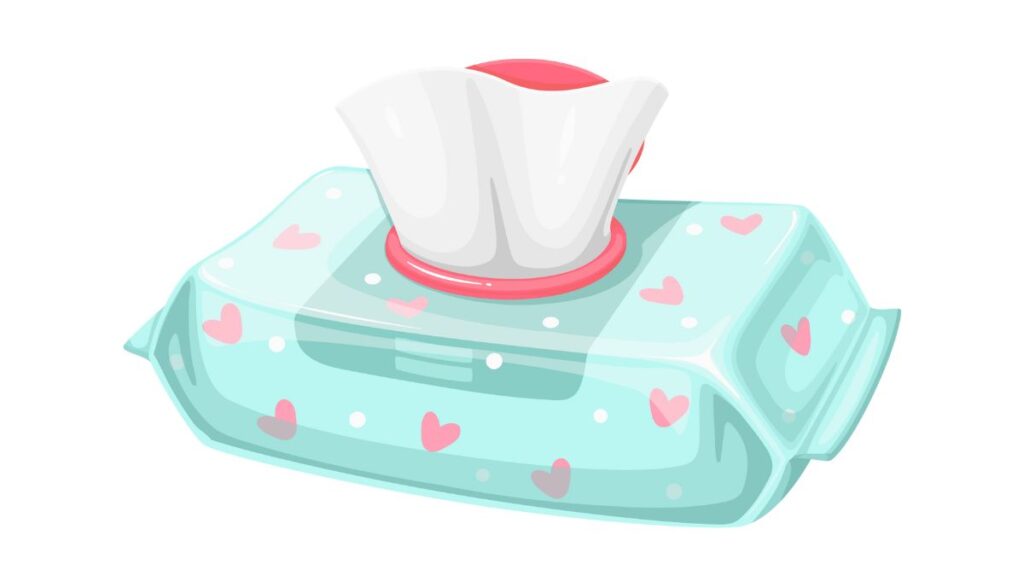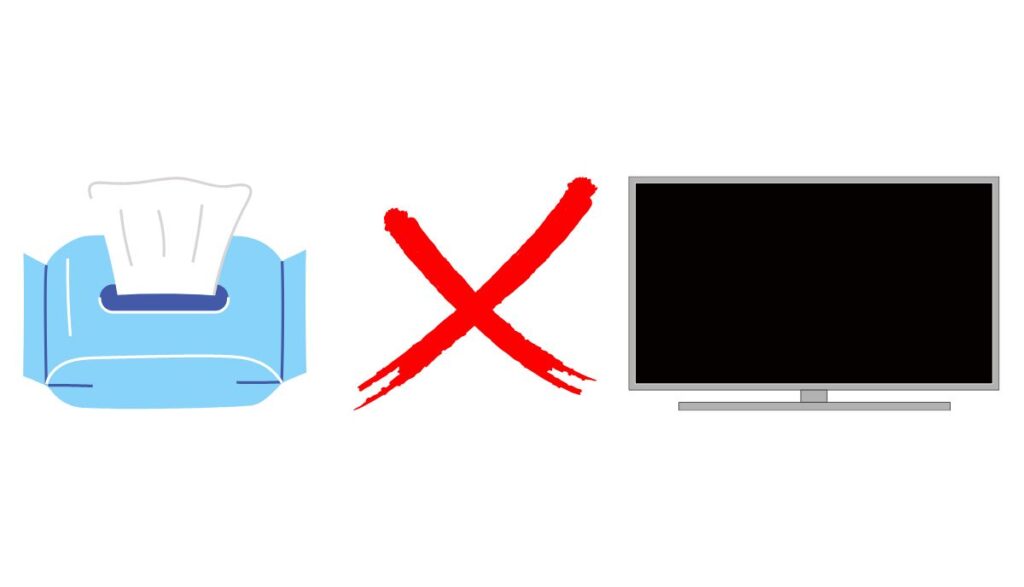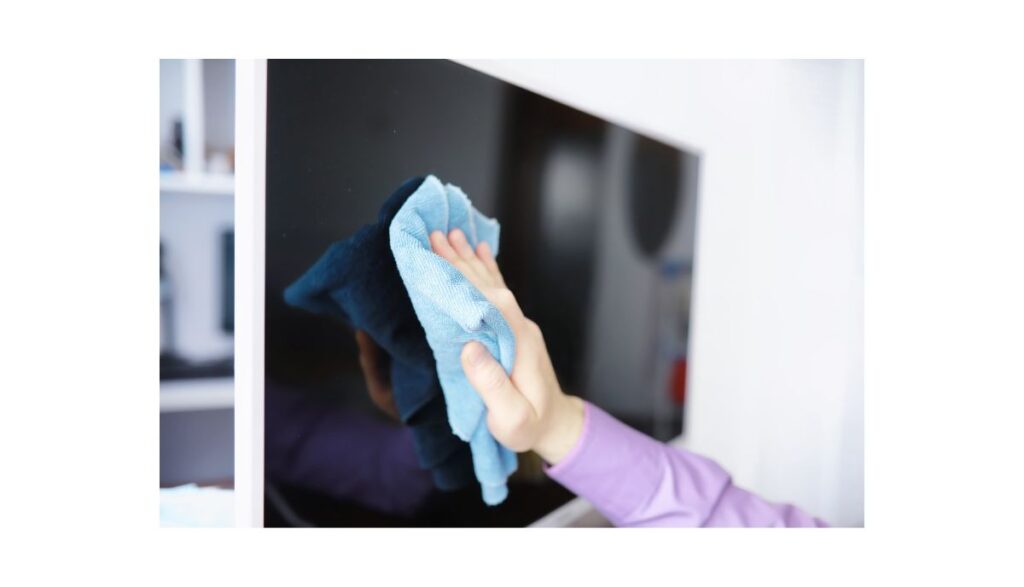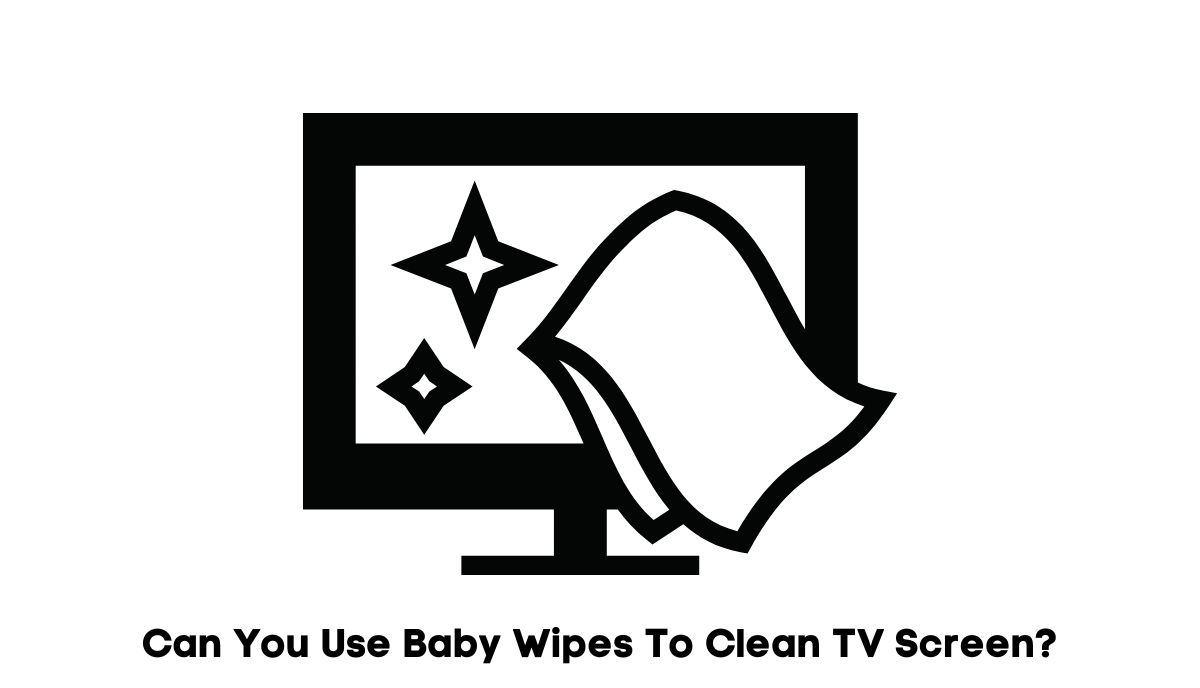Avoid using baby wipes on flat screen TVs. Their ingredients, like surfactants and preservatives, can cause streaks and scratches. Choose a microfiber cloth for safer cleaning
Why Do People Use Baby Wipes To Clean A Flat Screen TV?

One study in Pediatrics and Neonatology (“Fiona MacVane Phipps, Jeanne Lythgoe, Penny A Cook, James Ackers-Johnson, Alexandra M. Clarke-Cornwell”) found that high-quality baby wipes could clean babies between birth and eight weeks.
Babies within that age bracket have extremely sensitive skin. And yet, you can apply baby wipes during diaper changes without harming the infants. You can see how this information would encourage consumers to use baby wipes on a tv screen.
After all, modern flatscreens are delicate. But they are not as sensitive as a newborn baby’s skin. Keep in mind that baby wipes are already widely used in situations that have nothing to do with babies.
For instance, the experts at Nice N Clean Wipes encourage homeowners to apply them in the following scenarios:
- Moping the floor.
- Wiping kitchen counters.
- Cleaning the refrigerator.
- Removing grease from pots and pans.
- Wiping the trash can.
- Dusting furniture.
- Freshening houseplants.
Because baby wipes have so many conventional applications, most homeowners won’t hesitate to apply them while cleaning a flatscreen TV.
Are Baby Wipes Safe For TV Screens?

No, baby wipes are not safe for tv screens. This paper in Pediatric Dermatology has a diagram describing the structure of a baby wipe. The item consists of a cloth (base sheet) and a formulation of ingredients that allow the baby wipe to remove dirt and grime.
The base sheet comes in varying levels of thickness. Additionally, some sheets are softer and more absorbent than others. The formulations are the baby wipe’s crowning jewel because they have hypoallergenic ingredients that include a surfactant, preservation system, and buffering system, along with elements that prevent friction damage.
Because of these components, baby wipes do a better job of cleaning fecal matter and urine than traditional cloth and water. Unfortunately, those same ingredients make baby wipes a threat to your TV screen.
While baby wipes remove dirt and even smudges, they will leave streaks and tiny scratches behind. They are not worth the hassle.
How To Clean TV Screen With Baby Wipes?

Don’t clean the TV screen with baby wipes. Use a soft, dry microfiber cloth that is unlikely to scratch the screen. Follow these steps:
- Switch the TV off. You won’t damage the screen by keeping the TV on. But you can’t see the streaks and marks when the screen is lit. A black screen allows you to scrutinize the results of your efforts.
- Read the manual. Does it recommend specific cleaning techniques and products? The manufacturer will void your warranty if you damage the screen because you failed to follow instructions. Do what the manual says.
- In the absence of a manual or unique cleaning instructions, wipe the screen gently with a dry cloth. The initial goal is to remove dust. Some people attempt to remove smudges and stubborn stains by applying pressure. That is a mistake. You will misalign the liquid crystals in the screen.
- Attack oil and stains with a damp cloth. Make the cloth wet (or damp) and wipe the screen. Don’t spray water on the screen itself.
- Dry the screen and study it. Have the smudges and stains persisted? This can happen when children touch the TV with grimy hands. Change tactics.
- Add a drop of dish soap to a quarter cup of water.
- Again, apply this mixture to the cloth, not the screen.
- Wipe the screen with the soapy cloth.
- If you’re satisfied, get a second soft, damp cloth and clean the soapy residue.
- Use a third cloth to dry the screen.
What if the smudges and streaks are still there? You can repeat the steps above. If they fail a second time, experiment with the following options:
- Get distilled water. Unlike conventional water, distilled water doesn’t have impurities. It won’t leave a residue.
- Make the cloth damp with the distilled water and wipe the screen gently. Once again, don’t apply pressure. Doing so will damage the screen.
- If you can still see the streaks and smudges, use vinegar. Add half a cup of vinegar to half a cup of distilled water.
- Apply the mixture to the cloth and wipe the screen.
The steps above will come in handy if you accidentally cleaned the TV with baby wipes and they left ugly streaks and markings. Use distilled water and vinegar to fix your mistake. In case you’ve never cleaned a TV screen before, try to keep the following tips and factors in mind:
- Older TVs are easier to clean because the screen is glass. It will respond to any cleaning tools and techniques that work on the glass items in your home, such as windows.
- If your TV is on a wall or stand, support it with one hand while the other wipes the screen. Otherwise, it may tip over.
- Spraying the screen with water or vinegar mixtures is out of the question.
- Don’t use ammonia or acetone. The chemicals will scratch the screen. That is the best-case scenario. In the worst case, they will peel the coating away.
- Don’t use window cleaners like Windex. They have harsh chemicals that eat through the screen’s coating. Windex is only suitable for glass screens like those found in CRTs.
- If you have failed to remove stubborn stains and marks, buy a specialized TV cleaner. They are the more expensive option, but they work. Stick to cleaners that don’t include ammonia or acetone in the ingredients list. Where possible, find natural screen cleaners.
- Don’t use cleaners with an abrasive.
- Don’t use Lysol wipes. The disinfectant wipes have harsh chemicals. They will strip the screen’s delicate film away.
- Don’t use paper towels. They will scratch the TV.
- Don’t use Kleenex tissues.
- Look at the screen at different angles to confirm that you’ve succeeded.
- If the TV sits in a cabinet, clean the cabinet to prevent the dust from clogging the vents. Clogged vets lead to overheating.
- Clean the remote. Remotes go through multiple hands a day. Some of those hands are dirty. You may unknowingly carry grease and oil from the remote to the TV screen. That doesn’t even account for the germs you will pick up. Unless you’re the only one sneezing and coughing on the remote, take a moment to sanitize it after cleaning the TV screen.
- Clean once a week. Some smudges become stains because you allowed them to sit on the screen for weeks and months. Cleaning the screen once a week prevents dirt and grime from accumulating.
Best Baby Wipes To Clean TV
You can’t clean a screen with baby wipes. However, you can use electronic wipes. Unlike baby wipes, they clean without leaking streaks and smudges. Some of the best options on the market include:
- Weiman Electronic And Screen Disinfecting Wipes
These wipes have a formula that kills 99 percent of germs and bacteria. They will make short work of dirt, grime, dust, and fingerprints. Their formulation is scratch-free.
- Maxi Clean Lens Wipes
These wipes clean everything from camera lenses and binoculars to web cameras and eyeglasses. The pre-moistened wipes remove streaks and smudges without leaving a residue. Don’t expect a strong alcohol smell.
- Care Touch Lens Cleaning Wipes
This package comes with over two hundred individually wrapped wipes boasting a high-tech formula that cleans phone lenses and eyeglasses without leaving streaks or residue. The pre-moistened wipes are safe for coated lenses.
- Windex Electronic Screen Wipes
While Windex window cleaner is dangerous, Windex screen wipes are safe. The anti-static cloth works on tablets, TVs, laptops, cameras, etc. Consumers use the wipes to remove smudges, streaks, and fingerprints. The package containing the wipes is resealable, which simplifies storage.

